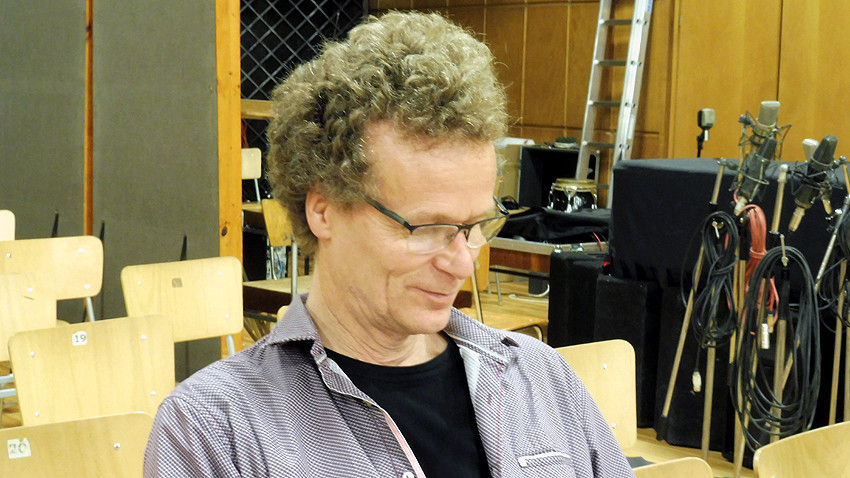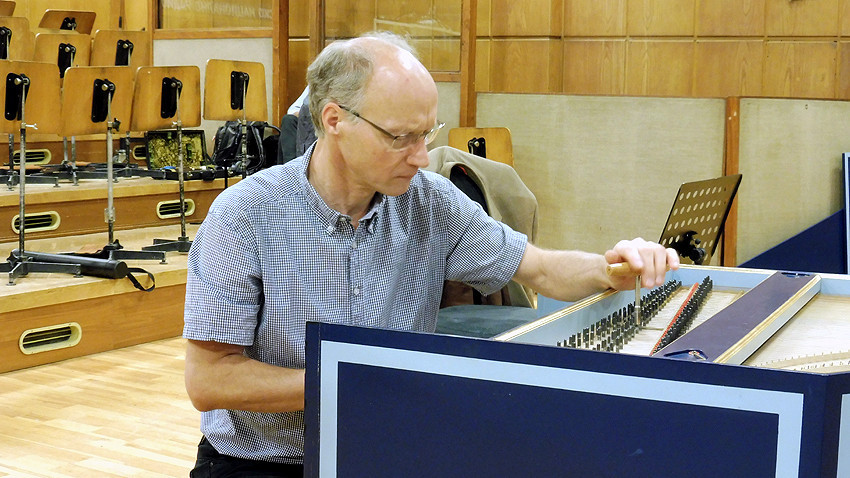36 years after its foundation, the Akademie für Alte Musik Berlin has had its first concert in Bulgaria. Lovers of the original sound of centuries-old music were pleased as in the First Studio of the Bulgarian National Radio they listened to an interesting program in which focus was put on the European Baroque. Selected works by composers from the late 17th and early 18th centuries like Veracini, Purcell, Händel, Rebel, Telemann, Vivaldi, and Geminiani, presented the various faces of Baroque music.
 “I think that in some ways Europe back then achieved more in comparison to what we have done. Many Baroque composers were recognized throughout Europe and felt like citizens of the world," concertmaster Bernhard Forck says. "Our program shows that even back then there was unity, although this unity was mostly in the sphere of music.”
“I think that in some ways Europe back then achieved more in comparison to what we have done. Many Baroque composers were recognized throughout Europe and felt like citizens of the world," concertmaster Bernhard Forck says. "Our program shows that even back then there was unity, although this unity was mostly in the sphere of music.”
In addition to the concert, there was a master class on wind instruments, led by Christian Beuse and a master class by Bernhard Forck on string instruments. For students of the music school in Sofia, as well as for other children, the musicians of the orchestra presented various historical instruments and their sound. Event organizers were the Goethe-Institut and the Bulgarian National Radio.
The Academy for Old Music Berlin was founded in 1982 in the then capital of the German Democratic Republic, Berlin. It quickly established as one of the best chamber ensembles that has been preserving the authentic sound of ancient music. For this purpose musicians even use authentic instruments dating back to the times of Baroque or copies of such instruments.
“This music is written for these instruments," Bernhard Forck says, “The instruments themselves suggest many things about interpretation, so a performer who plays a modern instrument, cannot comprehend certain features of music. Of course there are no recordings of that time, and the number of historical treatises on the topic of performing this music do not provide us with the complete idea. It's like talking about a painting without presenting any image. Music has its own life and instruments are needed to breathe life into it. Of course not only the instruments are important but their tuning, too. Baroque music is closely related to dance, so we must always keep in mind that people should be able to dance to its sound. But I am not a dogmatic person myself, and I do not think old music is impossible to be played using new instruments."
 We asked organ and cembalo player Raphael Alpermann about the most important things in music:
We asked organ and cembalo player Raphael Alpermann about the most important things in music:
"The most important things are not external but it is this feeling of music. Naturally, we cannot now know how people perceived it at a given time, but we are getting closer to the truth, especially in music that also contains singing. Lyrics shed light on the image of music and it can be convincingly presented to the modern listener. This is our task and I guess that in the past this music sounded the way we perform it. Naturally, nobody can know for sure. It is important to present these images (assisted by the lyrics) convincingly so that listeners become part of the atmosphere. This is what gives musicians a great deal of satisfaction."
Since its founding, the Academy for Old Music Berlin has regularly performed numerous concerts (over 100annually), both in Germany and abroad, reaching Buenos Aires, the United States and Japan. During these tours the orchestra plays in a different composition that can vary from a chamber to symphony orchestra. They play not only instrumental works, but also operas and oratories. The Academy for Old Music Berlin often invites internationally recognized instrumentalists and singers as soloists. The successful recording activity of the Akademie für Alte Musik Berlin should also be mentioned. Evidence of the international prestige of the orchestra are more than a million copies of recordings of their live concerts and performances. In 2006, the Academy was awarded the Telemann Preis of the city of Magdeburg and in 2014 it received the Bach Medaille of the city of Leipzig and the ECHO Klassik Award.
English: Alexander Markov
Photos: Vladimir VladimirovOn November 9, one of the halls of Trakia Ensemble in Plovdiv will host the traditional masterclass "With Kichka Savova’s Songs" . The event is organized by the Kichka Savova Foundation, chaired by Stefka Zdravkova, daughter of the renowned Thracian..
For thirty years now, Bulgarian violinist Iskrena Yordanova has been living in Lisbon. Everything she does as a musician is related to Baroque music. She has devoted much of her time to discovering ancient manuscripts, which she brings back to life with..
Kottarashky is one of the most intriguing musicians to have appeared on the Bulgarian music scene in the first decade of the 21 st century. The man behind the stage name is Nikola Gruev, and his work is an ongoing genre-blending experiment. He is..
Acoustic pop with roots in Bulgarian folklore – this is the music associated with the duo Dimitar & Hristo. Dimitar Atanasov, Hristo Mladenov and the..
For Plamen Bonev De La Bona, as a performer and songwriter, 2024 is a year filled with love. “Obicham” (I Love) is the title of his latest single,..

+359 2 9336 661
